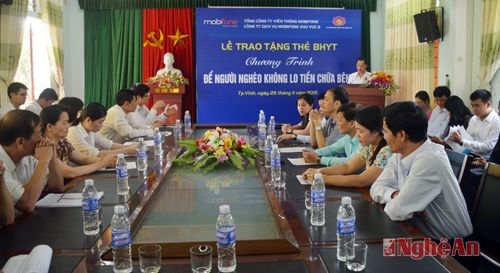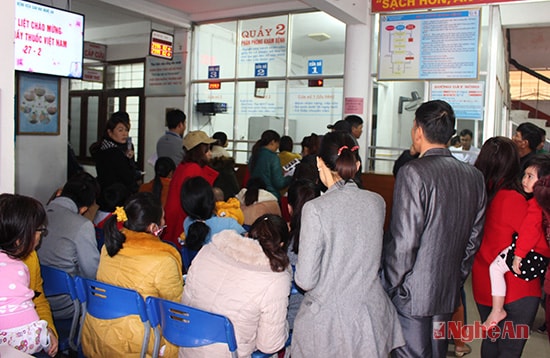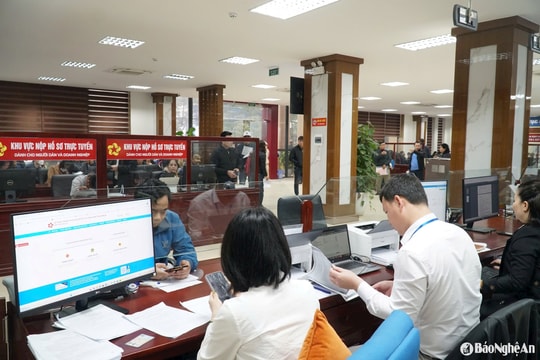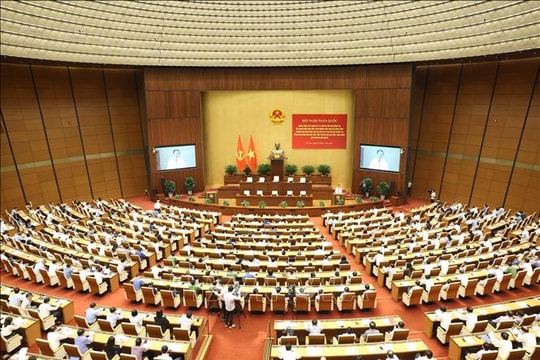New points in the Law on Social Insurance (amended)
(Continued from previous issue)
(Baonghean) -The amended Law on Social Insurance was passed by the National Assembly at the 8th Session of the 13th National Assembly, effective from January 1, 2016, including 09 Chapters and 125 Articles.Some provisions have been amended to ensure fairness and equality for participants, ensure people's social security rights, supplement some appropriate regimes and determine the legal status of Vietnam Social Security as: a state agency with the function of implementing social insurance regimes and policies, managing and using social insurance, health insurance, unemployment insurance funds; inspecting social insurance, unemployment insurance, health insurance payments and other tasks as prescribed by the Law. The new points of the amended Social Insurance Law can be specified as follows:
III. Regarding social insurance regimes:
1. Compulsory social insurance regime:
1.1 Sick leave:
+ For diseases requiring long-term treatment, the current annual benefit period is not specified, but the maximum benefit period is 180 days. After that, if treatment continues, the sick leave benefit will continue to be enjoyed at a lower level; at the same time, the maximum benefit period is specified to be equal to the period of social insurance contribution;
+ Amend the regulation on the daily sickness allowance level by dividing the monthly sickness allowance by 24 days (currently divided by 26 days);
+ Regulate a common benefit level for recuperation and health recovery after illness or maternity leave for one day equal to 30% of the basic salary (current regulations have two levels: 25% for rest at home and 40% for rest at a centralized location).
 |
| Investing in a system of health stations to provide good primary health care for the people. In the photo: medical staff of Nghia Hoa commune examines people. |
1.2 Maternity leave
+ Supplementing regulations that male employees whose wives give birth are entitled to 5 working days of maternity leave for normal births and 7 working days for cesarean sections, or births under 32 weeks of age; 10 days for twins and an additional 3 days/child for triplets or more; 14 days for 2 or more births that require cesarean sections;
+ Amending the conditions for enjoying maternity benefits in the case of female employees who have paid social insurance for at least 12 months but due to abnormal pregnancy must take time off work to rest as prescribed by a competent medical examination and treatment facility, they only need to ensure the condition of paying social insurance for at least 3 months in the 12 months before giving birth;
+ Amend the time female employees take off work to enjoy benefits when giving birth or adopting a child under 6 months old; add the case where male employees adopting a child under 6 months old are entitled to social insurance benefits similar to female employees adopting a child under 6 months old;
+ Amending the regulations in case only the mother participates in social insurance or both the father and mother participate in social insurance and the mother dies after giving birth, the father or the person directly raising the child is entitled to take leave to enjoy maternity benefits for the remaining time of the mother; in case the mother pays compulsory social insurance but does not have enough time to pay social insurance as prescribed and dies, the father or the person directly raising the child is entitled to take leave to enjoy maternity benefits until the child is 6 months old;
+ Supplementing regulations in cases where only the father participates in social insurance and the mother dies after giving birth or has an accident after giving birth and is not healthy enough to take care of the child, with confirmation from a competent medical examination and treatment facility, the father is entitled to take leave to enjoy maternity benefits until the child is 6 months old;
+ In case only the father participates in social insurance when the wife gives birth, the father will receive a one-time allowance equal to 02 months of basic salary for each child;
+ Increase 01 month for female employees' maternity leave in case the child dies after birth;
+ Supplementing regulations on maternity regime for female employees who are surrogate mothers and mothers who use surrogacy according to the provisions of the amended Law on Marriage and Family.
 |
| Health insurance card awarding ceremony. |
1.3 Retirement regime
- Amend the age conditions for receiving pensions for people with reduced working capacity as follows: From January 1, 2016, men aged 51 and women aged 46 and with a reduced working capacity of 61% or more are eligible for a pension at a lower level due to early retirement. After that, each year the age increases by one year until 2020, men aged 55 and women aged 50, with a reduced working capacity of 61% or more, are eligible for a pension at a lower level due to early retirement.
From January 1, 2016 onwards, men aged 50 and women aged 45, with at least 20 years of social insurance contributions, and with a working capacity reduction of 81% or more, will receive a lower pension due to early retirement.
- Expanding pension conditions for female workers who are full-time or part-time workers in communes, wards and towns participating in social insurance when they retire and have paid social insurance for 15 years but less than 20 years and are 55 years old, they are entitled to pension (however, if the pension is lower than the basic salary, it will not be compensated by the basic salary).
- About pension rate:
+ Amend the method of calculating pension rates according to the roadmap of gradually increasing the number of years of social insurance contributions for male workers to receive 45% of the average monthly salary as follows:
Retirement from 2018 onwards increases by 1 year each year until 20 years of social insurance contributions equivalent to 45% (2018 is 16 years; 2019 is 17 years; 2020 is 18 years; 2021 is 19 years and from 2022 onwards is 20 years); for women, 15 years of social insurance contributions correspond to 45% and then both men and women are calculated by adding 2% for each year, the maximum level is 75%. Thus, to achieve the maximum benefit of 75%, men must contribute social insurance for at least 35 years and women must contribute at least 30 years.
+ Increase the deduction rate for early retirement from 1% to 2% for each year of early retirement.
- Add specific regulations on the time of receiving pension.
+ For those who are paying compulsory social insurance, the time to receive pension is the time stated in the decision to quit work made by the employer when the employee has met the conditions to receive pension according to regulations.
+ For those who are reserving their social insurance payment period, the time to receive pension is calculated starting from the month following the month the employee is eligible to receive pension according to regulations.
+ Regarding the average salary used as the basis for calculating pensions: For those subject to the salary regime prescribed by the State, the Law stipulates.
Joined before 1995: Average of the last 5 years before retirement;
Participated during the period from 01/01/1995 to 31/12/2000: Average of the last 6 years;
Participated during the period from 01/01/2001 to 31/12/2006: Average of the last 8 years;
Participated from 01/01/2007 to 31/12/2015: Average of the last 10 years;
Participated between 01/01/2016 and 31/12/2019: Average of the last 15 years;
Participated between 01/01/2020 and 31/12/2024: Average of the last 20 years;
If you participate in social insurance from January 1, 2025 onwards, the average of the entire period will be calculated.
-About one-time social insurance:
+ Amend the regulations on conditions for receiving one-time social insurance to minimize the one-time social insurance benefits to ensure long-term social security, specifically: (1) Only settle one-time social insurance benefits for employees who have passed the working age but are not eligible for pensions or (2) go abroad to legally settle; (3) supplement regulations on settling one-time social insurance benefits for people with serious illnesses. Particularly for the armed forces, it is implemented according to current regulations, resolved immediately upon demobilization or discharge, if not eligible for pensions and the employee has a need:
+ Increase the one-time social insurance subsidy from 1.5 months to 2 months of the average monthly salary for social insurance contribution each year from 2014 onwards (equivalent to a social insurance contribution rate of 22% for the pension and death fund).
On June 22, 2015, the National Assembly issued Resolution No. 93/2015/QH13 on the implementation of the one-time social insurance policy for employees, stipulating: Employees are allowed to reserve their social insurance payment period to be eligible for pension to ensure their life when they reach retirement age according to the provisions of the Social Insurance Law 2014. In case an employee participates in compulsory social insurance after one year of leaving work, or a voluntary social insurance participant after one year of not continuing to pay social insurance but has not yet paid 20 years of social insurance when requested, they are entitled to receive one-time social insurance.
- Regarding the adjustment of social insurance contributions: For those who participated in social insurance before the effective date of this law, the adjustment of social insurance contributions will still be implemented as per the old regulations. For those who started participating in social insurance from the effective date of this law, the social insurance contributions will be adjusted based on the cost of living index of each period applied to all workers, regardless of whether they are in the public or private sector.
- Regarding suspension of monthly pension and social insurance benefits: (1) Remove the regulation in cases of serving a prison sentence but not receiving a suspended sentence; (2) Add cases where there is a basis to determine that the enjoyment of social insurance is not in accordance with the law.
 |
| Examination Department, Maternity and Pediatrics Hospital. |
1.4 Death benefit
- Add the condition that one must have at least 12 months of compulsory social insurance contributions for those who are participating or have reserved their social insurance contribution period to be eligible for funeral benefits (except in cases of death due to work-related accidents or occupational diseases).
- Add the subject of death benefit settlement for pensioners who are serving a prison sentence and die in prison;
- Supplementing regulations allowing relatives of employees to choose to receive monthly or one-time death benefits, except in cases where relatives are children under 6 years old, children or spouses whose working capacity is reduced by 81% or more;
- Supplementing regulations on cases where employees do not have relatives according to the provisions of the Law on Social Insurance, one-time death benefits will be implemented according to the provisions of the law on inheritance;
- Increase the one-time death benefit for employees who are paying or reserving their social insurance payment period and die from 1.5 months to 2 months of the average monthly salary for social insurance payment for each year of social insurance payment from 2014 onwards.
1.5. Regarding monthly salary for compulsory social insurance contribution:
Regulations on monthly salary for compulsory social insurance contribution for employees subject to the salary regime decided by the employer are designed in the following direction:
From January 1, 2016 to the end of 2017, the monthly salary subject to compulsory social insurance is the salary and salary allowance stated in the labor contract according to labor law.
From January 1, 2018 onwards, the monthly salary subject to compulsory social insurance is the salary, salary allowances and other supplements as prescribed by labor law.
2. Voluntary social insurance regime:
Amending regulations to allow employees who are eligible for pension by age but not eligible for social insurance payment period to pay until they are eligible for pension (without controlling the current ceiling age for voluntary social insurance participation).
(To be continued)
| RELATED NEWS |
|---|






![[Infographics] Những điểm mới trong quy chế thi tốt nghiệp THPT từ năm 2025 [Infographics] Những điểm mới trong quy chế thi tốt nghiệp THPT từ năm 2025](https://bna.1cdn.vn/thumbs/540x360/2024/12/28/bna_4672.jpg)

